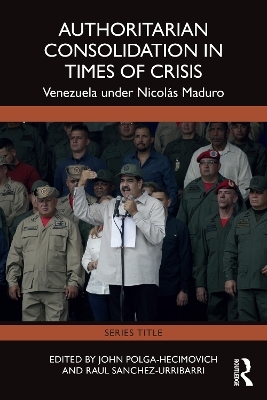
Authoritarian Consolidation in Times of Crisis
Routledge (Verlag)
978-1-032-60165-6 (ISBN)
- Noch nicht erschienen (ca. April 2025)
- Versandkostenfrei
- Auch auf Rechnung
- Artikel merken
Bringing together experts from across the social sciences, this volume examines the consolidation of authoritarianism in Venezuela under the government of Nicolás Maduro. Taking a comparative perspective, it explains how authoritarians can remain ensconced in power amidst profound economic crisis, widespread social discontent, low approval ratings, and international policies aimed at their removal. Moreover, it seeks to understand how the mechanisms and dynamics with which Maduro has consolidated an authoritarian regime in Venezuela. To this end, the editors differentiate the concept of authoritarian consolidation from the more studied processes of democratic erosion and democratic backsliding.
The book’s contributors explore in detail the country’s process of autocratization under Maduro at the national and international levels, identifying and explaining the role of diverse actors and institutions in Venezuela’s political regime, and their respective contributions to safeguarding and stabilizing the Maduro administration. By offering a systematic examination of the mechanisms by which regime change was fostered under Maduro’s rule, this volume directly engages with scholarly research on regime transitions and democratic collapse; democratic breakdown and the consolidation of authoritarian rule; and comparative institutional work on Venezuelan politics. The book is relevant to scholars and students of Venezuela, as well as anyone interested in the pressing question of regime crisis survival and authoritarian consolidation.
John Polga-Hecimovich is an Associate Professor of Political Science at the United States Naval Academy, where he is also the co-director of the Forum for Latin American Studies. His academic research focuses on the effects of political institutions on democratic stability, policymaking and governance, with a focus on Latin America. He has a Ph.D. in Political Science from the University of Pittsburgh and an M.A. in Latin American Studies from the Universidad Andina Simón Bolívar, Ecuador. Outside of the classroom, he has given briefings to the US State Department, the Defense Intelligence Agency, and US Southern Command on issues related to Latin American politics, and he has served as electoral systems expert for the Organization of American States (OAS). Raul Sanchez-Urribarri is Associate Dean (Academic and International Partnerships) at the School of Humanities and Social Sciences, and a Senior Lecturer in Crime, Justice and Legal Studies at the Department of Social Inquiry, La Trobe University, in Melbourne, Australia. He holds a Ph.D. in Political Science from the University of South Carolina, an LL.M. from Cambridge University and a Law degree from Universidad Católica Andres Bello, Venezuela. His research focuses on constitutionalism, judicial politics, and the rule of law in comparative perspective, with an emphasis on contexts of democratic deterioration and Venezuela in particular. He is a co-editor of Judicial Activism in Comparative Perspective (Peter Lang) and Informality and Courts (Edinburgh University Press).
Preface. 1. Introduction: Venezuela’s Political Crisis and the Concept of Authoritarian Consolidation Part I. Domestic Factors 2. Coup Proofing in Crisis: The Venezuelan Military under Nicolás Maduro 3. Control Tools: Elections, Maduro’s Authoritarianism, and Regime Survival 4. Authoritarian Capitalism in Venezuela: The Political Economy of Maduro’s Disorderly Liberalization 5. One Step Forward, Two Steps Back: The Venezuelan Opposition under Maduro 6. Venezuela’s (Un)Rule of Law under Nicolás Maduro 7. The Control of the Information Environment as a Pillar of Authoritarian Consolidation in Venezuela 8. Criminal Governance in Times of Post-Chávez Revolution and Questioned Legitimacy 9. Can Decentralization Contribute to Authoritarian Consolidation? Venezuela under Chávez and Maduro Part II. International Factors 10. The Nexus of Power: Autocratic International Cooperation and the Consolidation of Authoritarianism in Venezuela 11. The Maduro Doctrine: Foreign Policy Strategy and Regime Survival in Contemporary Venezuela 12. Circular Talks: Political Dialogue, Foreign Facilitation, and Authoritarian Learning in Venezuela 13. U.S. Foreign Policy, the Opposition, and the Maduro Government: Venezuela’s Authoritarian Slide in Ten Episodes 14. Exit, Voice, Loyalty, and Hunger: The Instrumentalization of Emigration Under Nicolás Maduro 15. The Venezuelan Diaspora and Maduro’s Authoritarian Consolidation 16. Evaluating Authoritarian Consolidation in Venezuela
| Erscheint lt. Verlag | 7.4.2025 |
|---|---|
| Zusatzinfo | 15 Tables, black and white; 15 Line drawings, black and white; 3 Halftones, black and white; 18 Illustrations, black and white |
| Verlagsort | London |
| Sprache | englisch |
| Maße | 152 x 229 mm |
| Themenwelt | Sozialwissenschaften ► Ethnologie |
| Sozialwissenschaften ► Politik / Verwaltung ► Politische Systeme | |
| Sozialwissenschaften ► Soziologie ► Spezielle Soziologien | |
| ISBN-10 | 1-032-60165-5 / 1032601655 |
| ISBN-13 | 978-1-032-60165-6 / 9781032601656 |
| Zustand | Neuware |
| Informationen gemäß Produktsicherheitsverordnung (GPSR) | |
| Haben Sie eine Frage zum Produkt? |
aus dem Bereich


